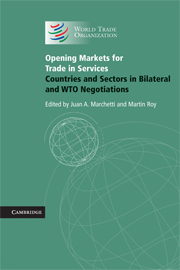Book contents
- Frontmatter
- Contents
- List of figures
- List of tables
- List of boxes
- List of contributors
- Foreword
- Acknowledgments
- Disclaimer
- Summary and overview
- PART I From Policy to Negotiations
- PART II Multilateral and Bilateral Negotiations on Services: Overall Perspectives
- PART III Challenges, Issues and Opportunities in Services Sectors
- 4 Telecommunications: can trade agreements keep up with technology?
- 5 The liberalization of cross-border trade in services: a developing country perspective
- 6 Out of stock or just in time? Doha and the liberalization of distribution services
- 7 Air transport liberalization: a world apart
- 8 Financial services liberalization in the WTO and PTAs
- 9 Beyond the main screen: audiovisual services in PTAs
- 10 The liberalization of postal and courier services: ready for delivery?
- 11 The liberalization of energy services: are PTAs more energetic than the GATS?
- 12 Market access for the government procurement of services: comparing recent PTAs with WTO achievements
- 13 A warmer welcome? Access for natural persons under PTAs
- PART IV Country Experiences with Services Trade
- Index
- References
6 - Out of stock or just in time? Doha and the liberalization of distribution services
Published online by Cambridge University Press: 05 December 2011
- Frontmatter
- Contents
- List of figures
- List of tables
- List of boxes
- List of contributors
- Foreword
- Acknowledgments
- Disclaimer
- Summary and overview
- PART I From Policy to Negotiations
- PART II Multilateral and Bilateral Negotiations on Services: Overall Perspectives
- PART III Challenges, Issues and Opportunities in Services Sectors
- 4 Telecommunications: can trade agreements keep up with technology?
- 5 The liberalization of cross-border trade in services: a developing country perspective
- 6 Out of stock or just in time? Doha and the liberalization of distribution services
- 7 Air transport liberalization: a world apart
- 8 Financial services liberalization in the WTO and PTAs
- 9 Beyond the main screen: audiovisual services in PTAs
- 10 The liberalization of postal and courier services: ready for delivery?
- 11 The liberalization of energy services: are PTAs more energetic than the GATS?
- 12 Market access for the government procurement of services: comparing recent PTAs with WTO achievements
- 13 A warmer welcome? Access for natural persons under PTAs
- PART IV Country Experiences with Services Trade
- Index
- References
Summary
Distribution companies provide the necessary link between producers and consumers, within and across borders. The efficiency of the sector helps ensure that consumer welfare is maximized and also that the benefits of freer trade in goods actually make their way to final consumers. Failure of the distribution sector to perform its role well – which can be induced by government policies restricting competition – can lead to a significant misallocation of resources and economic costs.
Despite being a key infrastructure service, distribution currently has the unfortunate characteristic of being one of the services sectors with the fewest multilateral commitments: there is a big gap between the sector's economic importance and the access conditions accorded in the context of the GATS. Preferential trade agreements – as well as WTO accessions – have provided for much more advances, especially with regard to the market access commitments of developing countries. Nevertheless, many WTO members remain without international trade commitments in this key sector, and a number of barriers continue to affect providers and raise costs for consumers.
This chapter reviews the key issues for the further liberalization of this sector at the multilateral level. It looks at the recent trends in the sector and related company strategies; analyzes existing multilateral commitments and provides a detailed picture of the restrictions applied to distributions services by WTO members; reviews the reform experiences of some important members; and evaluates the advances made in PTAs against the background of the ongoing negotiations in the Doha Round.
- Type
- Chapter
- Information
- Opening Markets for Trade in ServicesCountries and Sectors in Bilateral and WTO Negotiations, pp. 224 - 263Publisher: Cambridge University PressPrint publication year: 2009



